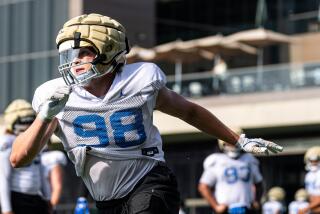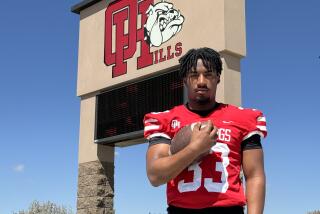IT ISNâT HICKSVILLE
WICHITA FALLS, Texas â Route 287 runs nearly straight across the rolling hills from Fort Worth, and its boundaries are barbed-wire fences, the occasional oil well and thousands of Black Angus and Hereford beeves.
Some are trying to escape the cold north wind in what protection is afforded by leafless trees, while others are poking through an accumulating white blanket for breakfast.
You drive 50-55 mph in the blowing snow and are passed by gun-racked pickup trucks doing 70 on the four-lane highway. The radio is 106 miles of company, and you are never more than one push of the scan button from George Jones or Tom T. Hall or Hank Williams Jr.
Itâs a place Skip Hicks can run to when heâs tired of running through USC and Washington defenders for UCLA. Itâs his refuge.
âIâve been in L.A. for five years, but most of the time it still feels like Iâm visiting there,â he says. âThe fans criticize you one day and the next day youâre their All-American.
âHere, theyâve been with me through thick and thin. Thatâs why I came back here after [tearing a knee ligament in his freshman year]. I wanted to rehabilitate around people I knew. They havenât changed.â
He has.
Hicks left Wichita Falls 4 1/2 years ago, a 205-pound running back with 4.45-second speed who had drawn more attention from West Coast schools than from those in his own state. He comes back from UCLA as an All-American in some ports, with 4.43-second speed and weighing 230.
*
âWe see you all the time on TV,â says Nichole Nichols, standing in Sikes Center, the local hangout. It is Wichita Fallsâ only shopping mall, and if its Dillards doesnât rival Robinsons-May or Macyâs for aesthetics and selection, âit has all I need,â Hicks says.
Largely, thatâs the Tommy Hilfiger shirts and caps Delores Hicks sends her son.
âWhat year are you now?â says Nichols, adding that âSkip and I were in science class together.â
âIâm in my last year,â Hicks says. âThis is my last game, the Cotton Bowl.
âAnd then what?â
âHopefully, the NFL.â
âMaybe youâll get with the Cowboys and we can get some tickets,â Nicholsâ father says.
Itâs Dallas Cowboys and Texas Longhorns and Texas A&M; Aggies country, according to the selection in the athletic apparel store where Hicks used to work.
âI wasnât much of a salesman,â he says. âI spent most of my time trying on shoes.â
On this day, he is wearing his UCLA Cotton Bowl sweatsuit, a UCLA stocking cap and his 1994 Rose Bowl ring, and many customers exchanging Christmas presents--most of them women--do a double-take as they walk past, trying to place him. Didnât-you-used-to-be looks are on their faces, and some stop to recognize and congratulate him. No autographs are requested, though that has happened.
Moselle Hicks is there, sitting on a bench, shopping having taken a toll.
âYouâre living out the dream of your father,â she tells her grandson. âAnd youâre living the dream of your uncle. And youâre living your own dream.â
A man in his 20s walks past, 15-20 feet away. He waves and smiles, but doesnât stop.
âI donât remember his name, but he was a quarterback and a basketball player,â Hicks says. âHe was a great athlete. There were a lot of great athletes here, better than me, but you never heard of them because a lot of them never got a chance.
âThey got in with the wrong crowd. Thereâs gangs here now, but theyâre different than in L.A. They are wannabes. They watch television and the movies and try to be like the gangs in L.A., and they have guns.
âBut the gangs in L.A. shoot people they donât know. Here, I lost two friends in the last couple of years who were shot by their best friends.â
He shakes his head in wonderment and sadness as he walks. The idea of joining any gang that isnât an athletic team doesnât make sense to him.
âI worked on a ranch, wrestling cattle, branding, doing everything,â Charles Hicks says. âI tried to get my son to be like a cowboy, wearing a hat, jeans, boots, all that. The only thing he took to was a pickup truck, and I think thatâs because you can only get one more person in it.â
*
The sun has come out and the unpredictable North Texas weather is having its way. If the people donât change, the elements sure do, and quickly. The snow has nearly melted after appearing only four hours ago, and the dirt road off Fairway Street is puddled.
The water wonât last long. The wind continues to blow, as it usually does in this region some call Texoma, others Baja Oklahoma. The border is less than 10 miles away.
âI started playing football with the Boys and Girls Clubs,â Hicks says as the car splashes to a stop in a recreation complex.
There are three football fields, each with a single grandstand that might hold 300 people. All are lighted with low standards and few bulbs, and each has the name of a benefactor, or maybe itâs just a solid citizen, and the signs also say that they are Boys and Girls Club fields 1, 2 and 3.
âOver there, I played nose guard or sometimes linebacker,â Hicks says, acknowledging that, yes, he also played running back.
âWe had three leagues, 7 and 8 years old, 9 and 10, 11 and 12, and we also had basketball and softball.â
The idea of Skip Hicks, owner of the Pacific 10 Conferenceâs touchdown-scoring record, playing defense seems ludicrous. It did to him, and to Charles Hicks, when Bob Field, a UCLA assistant, sat on the floral-covered love seat in the living room and told the father the Bruins were interested in his son as a defensive player.
âJohn Robinson had sat right there and said USC was interested in him as a running back, and Texas wanted him as a fullback,â Charles says. âWe told Bob that Skip wanted to play running back and Bob said, âWe only have one scholarship this year for a running back and I think thatâs taken.â â
Says Field: âCarnell Lake [now with the Pittsburgh Steelers] had played linebacker for us and he had been a running back in high school. I thought Skip could be another Carnell Lake for us. And, I guess as defensive coordinator, I was being a little selfish.
âYou know Skip. He doesnât say much. He didnât say anything for a few minutes, and then he just said, âI want to play running back.â From then on, I only talked to him about playing running back.â
*
Itâs what he had played at Burkburnett High, about 10 miles away and right on the border, hard by a rodeo arena.
But Hicks played fullback in the Oil Bowl, the annual high school all-star game that pits Texas players against those from Oklahoma.
Itâs played at Memorial Stadium, around the corner on Southwest Parkway from the Boys and Girls Club fields, and it was filled on that summer night.
âIt seemed huge to me then,â Skip Hicks says as the car stopped in the parking lot alongside the concrete and steel facility that holds 15,500. âI guess it looks a lot smaller now.
âI had played there against some of the Wichita Falls teams, against Hirschi and Sherman [highs], but this was something else.â
It was to Bobby Evans.
âBig âun!â he greets in a booming voice in the office of his sporting goods store. Evans is Wichita Fallsâ biggest football fan, and he knows where the bodies are buried.
âYou remember that Oil Bowl?â he asks, and Hicks nods and smiles, reminiscing as he always does with Evans, a regular on the annual tour of his hometown.
âThere have been seven players drafted [by the NFL] from that team,â Hicks says. âFrank Middleton, I think heâs with Tampa Bay, and Vernon Crawford, heâs with New England.â
âYeah, and that was after four years,â Evans says. âThis is the end of a five-year cycle, and there will be more, like you and Aaron Taylor.â
Taylor, who plays at Nebraska and also hails from Wichita Falls, has just won the Outland Trophy.
âThere were 21 players on that [Texas] team that went to Division I, and 17 of them went out of state. Homer Johnson, heâs in Garland [Texas], now, was the coach and we told him, âHomer, you can have anybody in the state.â
âHe had some unbelievable talent. We canât do that all the time, because if we did Oklahoma wouldnât play us anymore.â
The game has been played for 60 years.
âI played fullback in that game,â Hicks says. âTrumaine Mack was the tailback.â
They talk a bit more, and Hicks greets some more store employees before he asks Evans for some receiversâ gloves, extra large. Boxes are searched, but no gloves are found.
âTheyâre around here someplace,â Evans says.
âIf you find them, just give them to my dad,â Hicks says. âHeâll bring them to Dallas.â
*
The house is brick, with a corral fence. Itâs next to Shepard Air Force Base, but the usual sounds of the T-38s are missing because the pilots are off somewhere undecking halls of their boughs of holly.
âI played some softball over there,â Hicks says, gesturing in the direction of the base. âWhen I was young, I wanted to be a pilot. I thought I would go to the Air Force Academy. Then, as I got older, the idea of playing in the NFL grew stronger. Being a pilot can wait.â
There is a sign in the driveway, âBruinsâ Fans parking only,â and inside is a shrine to Charles Hicksâ son, with trophies and pictures, in uniform and out. A graduation picture and Burkburnett diploma are on a mantel over the fireplace, and a plush Bruin is on the coffee table.
A smaller picture of Charles Hicks in a Houston Oiler uniform is on a wall. It was taken during his brief stint in the NFL.
Nephew Kiki, an active 2-year-old in a UCLA sweatshirt, is running around, and a large portrait of Tonja Hicks in her Hirschi High cheerleader uniform is on the wall.
âThatâs where I was supposed to play,â Skip says.
Instead, he played at Burkburnett, where Charles grew up and now is the coach.
âIt seemed like every year there was a phone call to the UIL [University Interscholastic League], which is like the CIF, about that,â Hicks says.
Hicks gained more than 3,600 yards for Burkburnett High, breaking his fatherâs record, but doubters abounded.
âThey thought he would go to UCLA and get lost,â Charles says. âThey thought he would be a little fish in a big pond.â
The phone rings, and Charles tells an agent his son was still considering his representation options. No doubt, the agent first called Los Angeles and found out Skip Hicks wasnât there.
He was a few miles from where he would play his last college game, a big fish in a big pond back in the small pond he calls home.
More to Read
Go beyond the scoreboard
Get the latest on L.A.'s teams in the daily Sports Report newsletter.
You may occasionally receive promotional content from the Los Angeles Times.






